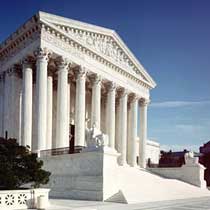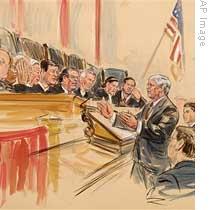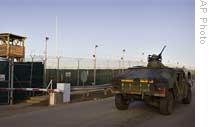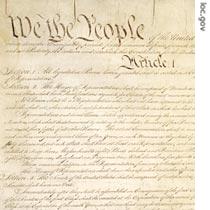VOA慢速英语-THIS IS AMERICA - US Supreme Court: When Society Nee
搜索关注在线英语听力室公众号:tingroom,领取免费英语资料大礼包。
(单词翻译)
A look at three recent decisions on gun rights, prisoners at Guantanamo and a case that was notable not just for its subject. Transcript1 of radio broadcast:
27 July 2008
VOICE ONE:
Welcome to THIS IS AMERICA in VOA Special English. I'm Steve Ember.
VOICE TWO:
And I'm Faith Lapidus. This week on our program, we turn our attention to the nine most important judges in the country.
 |
| United States Supreme2 Court building in Washington, D.C. |
COURT CRIER: "The honorable, the chief justice and the associate justices of the Supreme Court of the United States. Oyez! Oyez! Oyez! All persons having business before the honorable, the Supreme Court of the United States, are admonished3 to draw near and give their attention, for the court is now sitting. God save the United States and this honorable court."
VOICE ONE:
The words of the court crier are a modern-day reminder4 of the long history of the nation's highest court. Justices are appointed for life by the president and confirmed by the Senate.
Each term the Supreme Court receives thousands of petitions to hear cases. The court released seventy-two opinions this term.
Three cases, all decided6 by votes of five to four, got the majority of the attention.
VOICE TWO:
One case involved the District of Columbia -- as in Washington, D.C., the nation's capital. At issue was whether or not a city ban on handguns violated the Second Amendment8 to the Constitution.
JOHN ROBERTS: "We will hear argument today in case seven two-ninety, District of Columbia versus9 Heller."
VOICE TWO:
Dick Heller, a security guard who wanted to keep a gun at home for self-defense.
Chief Justice John Roberts introduced the case. Then he called on Walter Dellinger, a lawyer for the District of Columbia.
 |
| Artist's drawing of Walter Dellinger arguing for the District of Columbia in the gun ban case before the Supreme Court |
WALTER DELLINGER: "Good morning, Mister Chief Justice, and may it please the court. The Second Amendment was a direct response to concern over Article One Section Eight of the Constitution, which gave the new national Congress the surprising, perhaps even the shocking, power to organize, arm and presumably disarm10 the state militias12. What is at issue this morning is the scope and nature of the individual right protected by the resulting amendment, and the first text to consider is the phrase protecting a right to keep and bear arms ... "
VOICE ONE:
The Supreme Court heard the case in March. It announced its decision in June, in the last major ruling of the term. The court declared the handgun ban unconstitutional.
VOICE TWO:
The Second Amendment was approved in seventeen ninety-one. It says: "A well regulated Militia11, being necessary to the security of a free State, the right of the people to keep and bear Arms, shall not be infringed13."
VOICE ONE:
Legal experts and non-experts alike have long debated what these words mean. Does the amendment protect the rights of a group -- a well-regulated militia? -- or the rights of an individual?
And how does a court balance a collective desire to stop gun violence with an individual's desire for protection?
VOICE TWO:
Justice John Paul Stevens wrote the main dissent14, saying: "When each word in the text is given full effect, the Amendment is most naturally read to secure to the people a right to use and possess arms in conjunction with service in a well-regulated militia."
VOICE ONE:
The five justices in the majority, however, ruled that the amendment does protect an individual right to own a gun. But they suggested that does not mean anyone can own a gun, or any kind they want, or carry it in places like schools or government buildings.
Writing for the court, Justice Antonin Scalia said, "Like most rights, the right secured by the Second Amendment is not unlimited15."
The ruling may have settled one question. But critics said it raised others by not explaining enough what the limits may be.
(MUSIC)
VOICE TWO:
 |
| Camp Delta16 at the U.S. Naval17 Station at Guantanamo Bay, Cuba, has held foreign prisoners since 2002. Image reviewed by the U.S. military. |
Another ruling involved the rights of foreign terrorism suspects held at the American naval base at Guantanamo Bay, Cuba.
The court ruled that the prisoners held as enemy combatants have the constitutional right of habeas corpus. That means they have a right to appeal their detention18 in civilian19 courts. More than two hundred detainees remain at Guantanamo.
"The laws and Constitution are designed to survive, and remain in force, in extraordinary times," said the ruling in June.
The dissenters20, including Chief Justice John Roberts, said the decision will only make it more difficult to fight terrorism.
VOICE ONE:
Last Monday, at Guantanamo, the United States opened its first military war crimes tribunal since World War Two.
That same day, Attorney General Michael Mukasey urged Congress to write new rules limiting the power of civilian courts in hearings of detainees. He said Congress needs to settle what he called the "difficult questions left open by the Supreme Court."
(MUSIC)
VOICE TWO:
In another ruling in June, the Supreme Court barred death sentences for child rape21. The court, in a case from Louisiana, found execution unconstitutional for crimes that do not involve a death.
Justice Anthony Kennedy gave the opinion for the court, as he also did in the Guantanamo case. He said thirty-six states and the federal government permit execution, but only six states approve it for child rape. He said there was evidence of "a national consensus22" against capital punishment for that crime.
But a military law blog pointed5 out something that the parties in the case, and the court, missed. The federal government does permit the death penalty for child rape. Congress, in a two thousand six law, made that offense23 a crime punishable by death for members of the military.
VOICE ONE:
The Supreme Court can rehear a case, but that is unusual. It can happen only if one of the parties in the case asks for it. Last week, lawyers for the state of Louisiana asked for a rehearing.
The nine justices will consider the petition in September. If they decide to rehear the case, it will go on the court schedule for the new term that begins in October.
By law, the court begins its term on the first Monday. The term lasts a year but the court usually begins its summer recess24 by the end of June.
(MUSIC)
VOICE TWO:
One of the most important powers of the Supreme Court is judicial25 review. This is the power to judge if a state or federal action is legal under the Constitution. This power did not come from the Constitution. Rather, it developed from cases heard by the court in its early years.
The first Supreme Court met in seventeen ninety. The Supreme Court is the only court that was created by the Constitution. Article Three of the Constitution gave Congress the power to create lower courts.
VOICE ONE:
 |
| U.S. Constitution |
The federal government has only those powers given to it by the Constitution. All others are held by the states. This is why the United States does not have, for example, a national education system. Education is not discussed in the Constitution. So each state was free to develop its own system.
All decisions by the Supreme Court are final. There is no appeal. The court can change its mind on issues over time. But the only way to strike down a decision by the court is to amend7 the Constitution.
VOICE TWO:
The Supreme Court is asked to decide many of society's most difficult questions.
One ruling has been debated for the past thirty-five years. The court ruled that the Constitution protects a woman's right to have an abortion26, at least during the first three months of pregnancy27.
Social conservatives want the court to overturn its ruling in the case known as Roe28 v. Wade29. The court has narrowly upheld its decision.
VOICE ONE:
People may expect a Democratic president to appoint justices who are more liberal and a Republican to choose more conservative ones. Republican candidate John McCain says Roe v. Wade "should be overturned." Democrat30 Barack Obama calls himself "a strong believer in a women's right to choose with her doctor, her pastor31 and her family."
But things do not always work out the way people, or presidents, may expect. John Paul Stevens, considered the most liberal justice on the court, was appointed by Gerald Ford32, a Republican. Justice Stevens joined the court in nineteen seventy-five. He is eighty-eight years old.
VOICE TWO:
What do Americans think of the Supreme Court? Public opinion researchers at Quinnipiac University in Connecticut have been asking people for five years now. They released their latest poll this month.
For the first time they found that more voters disapprove33 than approve of the job the court is doing on social issues. The difference was narrow: forty-three percent to thirty-nine percent.
Twenty-five percent of voters said the Supreme Court is too liberal. Thirty-one percent said the court is too conservative. But thirty-three percent said the court is "about right."
(MUSIC)
VOICE ONE:
Our program was written by Nancy Steinbach and produced by Mario Ritter and Caty Weaver34. I'm Steve Ember.
VOICE TWO:
And I'm Faith Lapidus. Audio of the Supreme Court came from the Oyez Project, at o-y-e-z dot o-r-g. For a link, along with transcripts35 and MP3s of our programs, go to voaspecialenglish.com. We hope you join us again next week for THIS IS AMERICA in VOA Special English.
 收听单词发音
收听单词发音 




